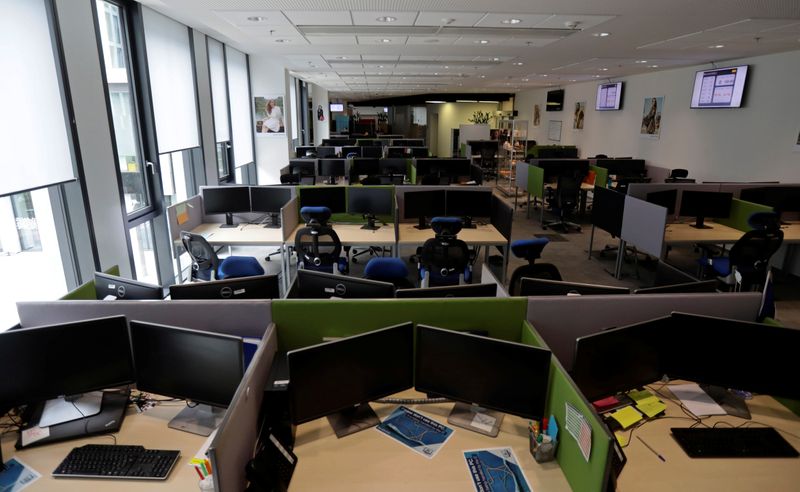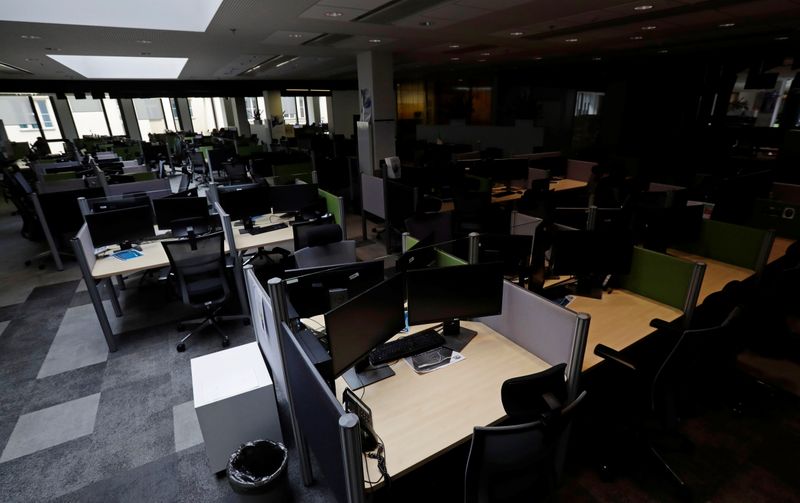PRAGUE/WARSAW (Reuters) – As the COVID-19 pandemic wipes out jobs and empties offices across the world, companies in Central Europe that provide remote, lower-cost services for multinationals are emerging as winners in the new business order.
From Prague and Warsaw to Bucharest, these firms have long provided outsourced or offshored business services such as software development, administration, payroll handling and research for big European and American customers. Now they are bucking the global trend by expanding and hiring.
“In a time of crisis, more business is shifting here,” said Roman Pavlousek, who runs a finance service centre for global industrial manufacturer Atlas Copco in the Czech city of Brno. “This is happening.”
Indeed, more than 90% of business services companies in the Czech Republic have continued to recruit during the pandemic, with 12% winning extra work from the Asia-Pacific region, according to a survey by the Czech branch of the Association of Business Services Leaders trade body.
While service centres in Asia can offer lower costs, Central and Eastern Europe offers geographical and time-zone proximity to western Europe and North America, with a deep pool of multi-lingual workers, business leaders told Reuters.
The region has drawn a host of big names, from Air France-KLM’s BlueLink International to Exxon Mobil. It also boasts expertise in automation, robotics and artificial intelligence – areas where corporate decision makers are increasingly looking to expand, the leaders said.
In Poland, emerging Europe’s biggest economy, business services companies have also kept the “For Hire” sign out as they continue to bring in new employees.
Iwona Dudzinska, managing director at Citibank Europe’s service centre in Poland, said the crisis had not slowed its growth plans.
“We are hiring around 100 people every month and conducting recruitment online,” she told Reuters.
‘ALL ABOUT TIMING’
The business services sector has grown from almost nothing 25 years ago to an industry employing nearly 750,000 workers across Central and Eastern Europe, and it is rapidly expanding, said Romek Lubaczewski, a partner at PwC, who predicted a short-term bump in the road for the sector.
“It is all about timing,” he added. “This crisis has shown that more things can be done remotely and this will benefit the region in the medium to longer term.”
Lubaczewski lives in the bustling university town of Krakow, whose 85,000 employees in the sector makes it Europe’s biggest business services centre hub.
Pepsico, Shell, State Street and other international companies have set up shop in the southern Polish city, tapping into a multinational workforce able to deliver complex services in numerous languages.
“When you are sitting in a country that doesn’t speak English, central Europe holds a massive advantage,” Lubaczewski added.
The novel coronavirus pandemic has devastated global economic activity due to government-imposed lockdowns aimed at containing an outbreak that has led to more than 4.2 million infections and over 285,000 deaths.
The Czech report from the Association of Business Services Leaders found that most companies see new business opportunities arising from the crisis as customers restructure, cut costs and look for new ways to do business.
“The opportunities we are talking about lay in the fact we are in the business of centralizing activities, finding synergies and running efficiencies,” said Pavlousek, who runs Atlas Copco’s services centre.
RISK MODELLING
Pawel Michalik, managing director of ING Tech Poland, said the pandemic would result in multinationals looking to outsource or offshore services in new areas.
“This is something that will affect the entire industry, and it will definitely have a positive impact on business service centres in the region,” he told Reuters.
“Banks may be more willing to outsource certain services such as risk modelling and regulatory reporting,” he said. “We launched such services last year in Warsaw and we will probably develop them faster than we originally planned.”
The region’s business services sector has been able to adapt to the requirements of national lockdowns better than most industries around the world.
Given the digital nature of their work, two-thirds of the sectors employees in Poland were able to work from home even before the COVID-19 pandemic. Now with far more than that number away offices, companies aim to keep many workers at home even once the crisis passes, according to the national Association of Business Services Leaders.
A widely expected increase in digitalization and a smaller emphasis on face-to-face contact by companies around the world, even after the pandemic, will further benefit Central Europe as a services hub, business leaders and analysts said.
“It’s going to be a chance for more companies to move work here as they are closing down their main operations in other more expensive countries,” said one worker at UBS in Krakow. “It’s happening, it’s going to accelerate.”
(Reporting by Michael Kahn in Prague, and Anna Koper and Alan Charlish in Warsaw; Editing by Pravin Char)





























